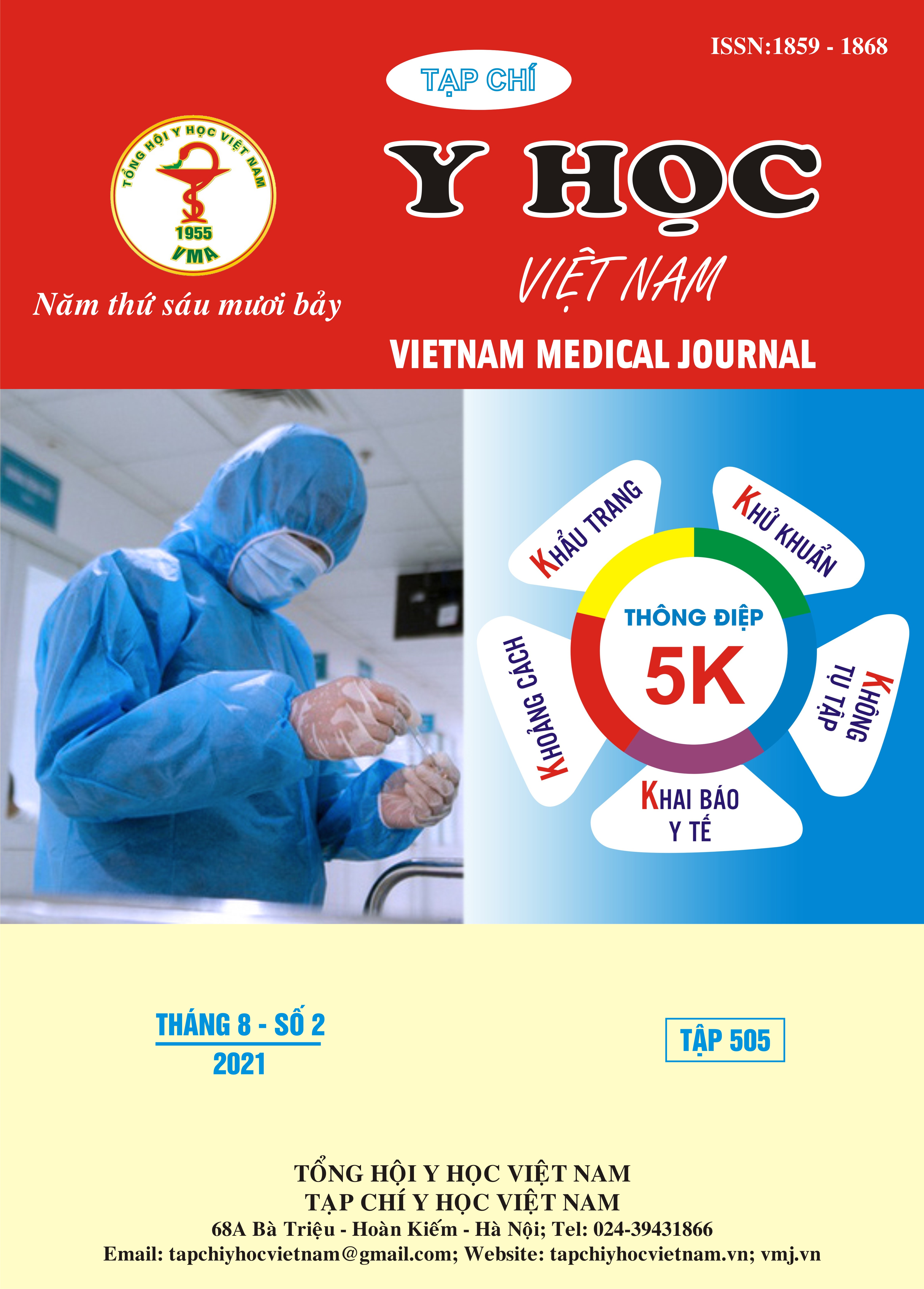PRELIMINARY ASSESSMENT OF DECITABINE EFFECTIVENESS IN TREATMENT OF MYELODYSPLASTIC SYNDROMES AT BLOOD TRANSFUSION HEMATOLOGY HOSPITAL
Main Article Content
Abstract
Aims: To evaluate the therapeutic efficacy and toxicity of decitabine in MDS (Myelodysplastic syndromes) patients. Subjects and methods: Descriptive case series. Patients who were diagnosed with MDS, suitable with the inclusion criteria and received treatment with decitabine 20mg/m²/ day x 5 days from January 2019 to July 2021 were included and analyzed retrospectively. Treatment response evaluation is set according to IWG 2006. Results: Thirty-two patients were selected (18 males, 14 females) in whom the highest proportion was MDS-EB2 (56.2%) according to WHO 2016 classification. The vast majority according to IPSS-R was the very high-risk group with 56.2%. Patients were treated from 1 to 11 cycles of decitabine with an overall response rate (ORR) of 21.9%; of which complete response (CR) 12.5% and partial response (PR) 9.4%. Complete bone marrow response (mCR) was 25%. The group of patients treated for > 4 cycles achieved a higher ORR, CR, time overall survival (OS), progression-free survival (PFS), acute myeloid leukemia-free survival (AMLFS) more than those treated with ≤ 4 cycles (p respectively: p = 0.032; 0.009; 0.007; 0.01; 0.009). The proportion of patients who became independent of red blood cell and platelet transfusion increased by cycles over time, with same as 40% at sixth cycle. Median follow-up was 7 months with median OS; PFS; AMLFS: 12.3; 7.9; 11.6 months, respectively (95% CI). OS and AMLFS lasted longer in patients who achieved PR/CR (p respectively: 0.004; 0.016). Common grade 3; 4 - complications during treatment were: infection 68.7%; neutropenia 68.7%; thrombocytopenia 65.6%; anemia 56.2%. Treatment complication death 18.7% of patients (mainly due to infection/ severe neutropenia). Conclusion: Decitabine is effective in improving hematopoiesis, reduction of blood transfusion needs and prolonging OS, PFS, AMLFS in MDS patients, especially those who get response.
Article Details
Keywords
Myelodysplastic syndromes, decitabine
References
2. Huỳnh Thị Bích Huyền, Lê Phương Thảo, Nguyễn Hữu Nhân, et al, Chẩn đoán, phân loại và tiên lượng loạn sinh tùy theo WHO 2016 tại bệnh viện Truyền máu Huyết học thành phố Hồ Chí Minh, 2019: Sở y tế, bệnh viện Truyền máu Huyết học. pp. tr34.
3. Nguyễn Quang Hảo, Trần Tuấn Anh, Lưu Thi Thu Hương. (2021), "Kết quả điều trị loạn sinh tủy bằng decitabine tại viện Huyết học - Truyền máu Trung ương", Tạp chí nghiên cứu y học, pp. tr.1-9.
4. Cheson Bruce D, Greenberg Peter L, Bennett John M, et al. (2006), "Clinical application and proposal for modification of the International Working Group (IWG) response criteria in myelodysplasia", Blood, 108 (2), pp. pp.419-425.
5. Kenneth Kaushansky Marshall A. Lichtman, et al,. (2016), "Myelodysplastic syndromes", Williams Hematology, 9th, Mc Graw Hill, New York Chicago San Francisco Athens London Madrid Mexico City Milan New Delhi Singapore Sydney Toronto, pp. pp.1341.
6. NCCN. (version 3.2021), "Myelodysplastic Syndromes".
7. Kantarjian Hagop, Issa Jean‐Pierre J, Rosenfeld Craig S, et al. (2006), "Decitabine improves patient outcomes in myelodysplastic syndromes: results of a phase III randomized study", Cancer: Interdisciplinary International Journal of the American Cancer Society, 106 (8), pp. 1794-1803.
8. Saba Hussain, Rosenfeld Craig, Issa Jean-Pierre, et al, First report of the phase III North American trial of decitabine in advanced myelodysplastic syndrome (MDS), 2004, American Society of Hematology.
9. Steensma David P. (2018), "Myelodysplastic syndromes current treatment algorithm 2018", Blood cancer journal, 8 (5), pp. 1-7.


